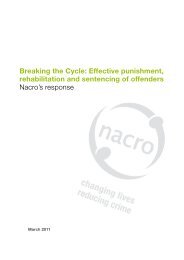Youth offending teams, young people and accommodation - Nacro
Youth offending teams, young people and accommodation - Nacro
Youth offending teams, young people and accommodation - Nacro
You also want an ePaper? Increase the reach of your titles
YUMPU automatically turns print PDFs into web optimized ePapers that Google loves.
<strong>Youth</strong> Offending Teams, Young People <strong>and</strong> Accommodation<br />
Housing departments<br />
� 46% of Yots rated their relationship with the Local Authority Housing Departments<br />
or Homelessness <strong>teams</strong> as good, 38% as adequate <strong>and</strong> 15% as poor. Departments<br />
varied from those that were considered receptive, but restricted in what they<br />
could offer to those that were felt to lack an underst<strong>and</strong>ing of the needs of <strong>young</strong><br />
<strong>people</strong> <strong>and</strong> unwilling to find <strong>accommodation</strong> for them.<br />
� There needs to be more cohesive working arrangements between Housing<br />
Departments <strong>and</strong> Yots, this could be achieved by developing agreements with<br />
Housing Departments that priority will be given to <strong>young</strong> <strong>people</strong> in need. Other<br />
options include Housing Departments identifying a worker to be responsible for<br />
<strong>young</strong> <strong>people</strong>, rather than homelessness generally or a housing worker could be<br />
seconded to the Yot, if the dem<strong>and</strong> for services could be justified. Finally Yots <strong>and</strong><br />
Housing Departments could explore the options for working more closely together<br />
to develop common assessments of <strong>young</strong> <strong>people</strong>s needs <strong>and</strong> to identify how coordinated<br />
support can be provided to help <strong>young</strong> <strong>people</strong> to successfully maintain<br />
tenancies.<br />
� Yots <strong>and</strong> Housing Departments should have protocols <strong>and</strong> agreements in respect<br />
of anti social behaviours <strong>and</strong> their impact on <strong>young</strong> <strong>people</strong>. Anti social behaviour<br />
orders need to be supported, particularly where they will impact on<br />
<strong>accommodation</strong>, to ensure that <strong>young</strong> <strong>people</strong> do not become the unintended<br />
victims because of by problems <strong>and</strong> difficulties caused by other family members<br />
or because the range of housing options available to them diminishes through the<br />
application of exclusion zones.<br />
Homelessness strategies<br />
� In terms of Yot involvement in the development of homelessness strategies fifteen<br />
(83%) had been part of planning groups <strong>and</strong> three (17%) have not. Of the those that<br />
have attended planning meetings eight (62%) had contributed information about<br />
the needs of <strong>young</strong> <strong>people</strong> who offend. When asked whether providing an input<br />
had made any impact on meeting the needs of <strong>young</strong> <strong>people</strong>, Yots generally felt<br />
that it had not to any significant extent, the main reasons being that here is a<br />
paucity of suitable Local Authority housing stock; there being no section within<br />
the strategy that addresses the issue from the viewpoint of a <strong>young</strong> person who<br />
offends <strong>and</strong> no resources being available to implement what is required.<br />
� Ensuring that there is a section in the homelessness strategy that relates to<br />
vulnerable <strong>young</strong> <strong>people</strong> <strong>and</strong> specifically those that offend in future planning<br />
cycles is clearly important, as this could help to make sure that Yots are seen as<br />
constituent members of the planning process, would raise the profile of <strong>young</strong><br />
<strong>people</strong> who offend <strong>and</strong> ensure that Yots have the opportunity to feed information<br />
into the planning processes.<br />
Other<br />
� Young People’s Partnerships <strong>and</strong> the links to Extending Entitlement present an<br />
opportunity to give priority to housing <strong>and</strong> <strong>accommodation</strong> issues at a local level<br />
<strong>and</strong> as a potential means of developing services<br />
Funding <strong>and</strong> resources<br />
� In total seven Yots (39%) indicated that funding had been made available in their<br />
area to develop local services. The schemes financed by Supporting People are still<br />
operational, but none of the services provided through <strong>Youth</strong> Justice Board funds<br />
have been sustained. This suggests that there needs to be defined funding<br />
streams that would allow the development of sustainable provision <strong>and</strong> specific<br />
28

















